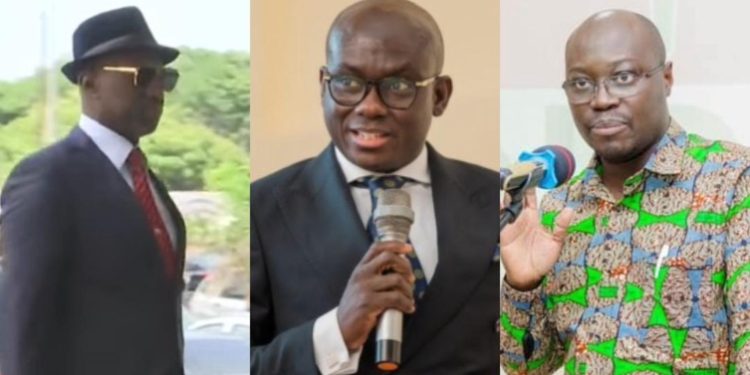
In the ongoing ambulance trial, the prosecution has refuted Richard Jakpa’s claims that he provided documents to the Attorney General’s office to aid in the prosecution of Dr. Cassiel Ato Forson, labeling them as false. Such claims are common in legal trials, where tactics and strategies play pivotal roles.
Richard Jakpa has accused the Attorney General of involving him at unusual hours to implicate Dr. Ato Forson. He testified in court that the Attorney General assured him of freedom if he cooperated by submitting documents supporting the case against Dr. Forson.
During cross-examination, Director of Public Prosecutions Yvonne Attakora-Obuobisa challenged Jakpa’s assertions, asserting that the Attorney General had already submitted all relevant documents to the court by February 29, 2022, which included those Jakpa allegedly provided via WhatsApp in July 2022. Attakora-Obuobisa emphasized that the Attorney General did not acknowledge or rely on Jakpa’s documents.
Regarding Jakpa’s claim of assurances from the Attorney General, Attakora-Obuobisa pointed out that the Attorney General had opposed Jakpa’s submission of a no-case application by March 12, 2023, contradicting Jakpa’s assertion that he was promised immunity from prosecution.
Prosecutorial misconduct, such as withholding evidence or making improper statements, undermines the fairness of trials. Allegations of such misconduct are typically addressed through legal avenues, including disciplinary proceedings and judicial review.
In another development in legal terms, “breach of faith” generally refers to a violation or betrayal of trust or confidence. In the context of trial principles, specifically within the criminal justice system, “breach of faith” can manifest in various ways:
Witness Testimony: If a witness gives false testimony under oath, it is considered a breach of faith because it undermines the trust placed in witnesses to provide truthful information to the court.
Legal Representation: A breach of faith can occur if a defense attorney fails to adequately represent their client’s interests, such as through negligence or conflict of interest.
Judicial Conduct: This can refer to instances where a judge exhibits bias or engages in misconduct during the trial, compromising the fairness and impartiality expected in legal proceedings.
Going forward in mirroring the trial under; Prosecutorial Misconduct: When prosecutors act improperly, such as withholding exculpatory evidence or making prejudicial statements, it constitutes a breach of faith as it undermines the integrity of the trial process.
While Jury Misconduct underscore issues such as: If jurors engage in misconduct, such as discussing the case outside the courtroom or considering improper information, it constitutes a breach of their duty to base their decision solely on the evidence presented in court.
In another development, Prosecutorial misconduct refers to inappropriate or unethical behavior by a prosecutor during a legal proceeding. This can undermine the fairness of the trial and the integrity of the justice system. Examples of prosecutorial misconduct may include:
Withholding Evidence: Prosecutors have a legal obligation to disclose all relevant evidence to the defense. Failure to disclose exculpatory evidence (evidence that could potentially prove the defendant’s innocence) is a serious form of misconduct.
Making Improper Statements: Prosecutors must refrain from making inflammatory remarks, personal attacks on the defendant or witnesses, or statements that are not supported by evidence. Such actions can prejudice the jury or judge against the defendant.
Suborning Perjury: Encouraging or allowing witnesses to testify falsely is considered misconduct because it undermines the truth-seeking process of the trial.
Improper Jury Arguments: Prosecutors should base their arguments on the evidence presented in court. Making arguments that appeal to jurors’ emotions or prejudices rather than the facts of the case can be considered misconduct.
Using False Evidence: Introducing evidence that the prosecutor knows or should know is false or misleading is a serious breach of ethics.
Selective or Vindictive Prosecution: Prosecuting a defendant based on improper motives, such as race, religion, or political beliefs, rather than on the merits of the case, is considered misconduct.
When allegations of prosecutorial misconduct arise, they are typically addressed through legal channels, such as appellate review, disciplinary proceedings by legal authorities, or in extreme cases, judicial sanctions or retrial orders.
If you’re looking for specific instances or evidence of prosecutorial misconduct in a trial, it’s important to refer to the specific case and examine the allegations and findings made by the courts or legal authorities involved.
Story by: AYM Kukah




